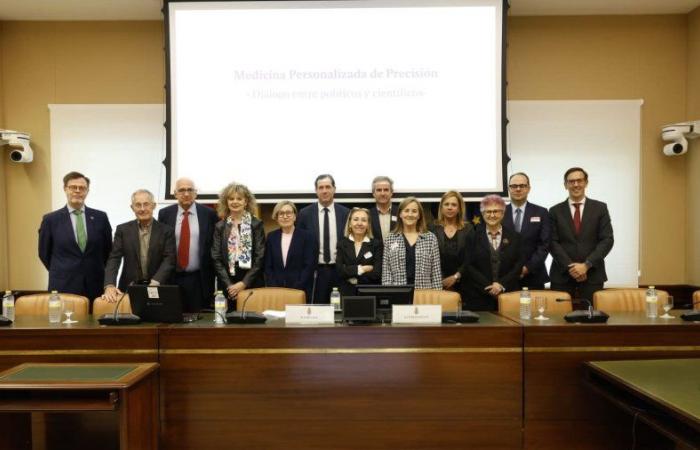The Sagasta Chamber of the Congress of Deputies has hosted the day “Personalized precision medicine: dialogue between politicians and scientists”organized by the Roche Institute Foundation. The objective of this day is to create a meeting point between the scientific community and parliamentary representatives, deepening the concept and benefits of personalized precision medicine and, in this way, contribute to boosting the necessary changes for its correct implementation in the Health system.
during the opening of the day, Mrs. María Sainz, first Secretary of the Health commission of the Congress of Deputieshas highlighted the need to continue promoting personalized precision medicine as a key tool to move towards a more fair and efficient health system. He stressed that this approach must be based on prevention, collaboration between the public and private sphere, and the rigorous application of scientific evidence, in order to offer effective responses before all types of pathologies, including cancer and genetic diseases. “The latest report of the Roche Institute Foundation represents a precise adjustment on the path that we must continue touring, a clear demand for citizenship. Thanks to the use of anonymized data we can move towards a real improvement of the population’s health, which is the final objective of the National Health System: respond with quality from a first level health system”. Next to her, Patrick Wallach, president of the Roche Institute Foundationexplained that “In the current political context in which a lot of health policies and strategies are being launched in which personalized precision and digital health are fundamental, it is necessary that the responsible agents have the necessary information for decision making, and therefore from the Roche Institute Foundation we have promoted the celebration of this day”.
During the day, recognized experts in the subject have addressed key aspects of personalized precision medicine. Specifically, the Dr. Carmen Ayuso, Head of the Department of Genetics of the Jiménez Díaz Foundation and Scientific Director of the Jiménez Díaz-Uam Foundation Health Instituteduring his presentation he has stressed that “Personalized precision medicine is a great opportunity for citizens and the health system”. Throughout his speech, he has made a tour from molecular biology to medicine, sharing the true impact on people’s life and public health, and stating that this way of doing medicine “It allows us to adapt the strategies of prediction, prevention, diagnosis, treatment and monitoring of the individual characteristics of each patient”. Through concrete examples, it has highlighted benefits such as “Greater efficacy, less toxicity and resources optimization”.
For its part, the Dr. Fernando Martín-Sánchez, Deputy Director Manager of the Area of Medical Informatics, Digital Strategy and Innovation of the La Paz Universityhas focused its intervention on the main challenges to implement personalized precision medicine in clinical practice, highlighting that “The interoperability of information systems and proper management of biomedical data are key to realizing personalized precision medicine, taking into account ethical, legal challenges, adding that it is key to incorporate new professional profiles such as the recently approved specialties of medical genetics and laboratory clinical genetics, as well as specialists in data sciences or medical information, etc..
During your presentation, the Dr. Ángel Carracedo, Director of the Galician Public Foundation of Genomic Medicine of the Galician Health Service and coordinator of the Genomic Medicine Group of the University of Santiago de Compostelahas offered a global vision on the situation of personalized precision medicine in Spain, highlighting both the advances achieved and the challenges that must still be addressed. “The heterogeneous advance by the Autonomous Communities in the implementation of personalized precision medicine makes it necessary. In this sense, he has urged parliamentary representatives to support “The creation of a specific technical commission of personalized precision medicine within the Interterritorial Council of the National Health System, which leads this coordination and guarantees an equitable implementation throughout the country, as stated in the recently published report and that I have had the honor of coordinating ‘Coordinated approach in personalized medicine of precision between autonomous communities’.
One of the most outstanding moments of the act has been the round table with representatives of the Congress and the Senate, of different commissions, moderated by the Dr. Enrique de Álava, Head of the Pathological Anatomy Service of the Virgen del Rocío-Institute of Biomedicine of Seville and coordinator of the Personalized Medicine Plan and precision of the Ministry of Health and Consumption of the Junta de Andalucía. As explained, during the same, “During the round table we wanted to go beyond diagnosis and focus on solutions: how to articulate coordination between autonomous communities, what profiles and structures we need to incorporate, and what role should data regulation and interoperability to make possible precision personalized medicine. The debate has reflected a growing political commitment to advance these fronts”. In this sense, all parliamentarians have agreed on the need to strengthen territorial equity, ensure the financing of these technologies and advance the continuous training of health professionals to avoid inequities and ensure equitable access to diagnosis, as well as assess and evaluate the various implementation models.
The act has been closed by Mrs. Sandra Moneo, president of the Commission of Science, Innovation and Universities of the Congress of Deputieswho stressed that talking about personalized precision medicine is to address one of the most decisive pillars in the prevention and treatment of diseases within the health system. Moneo recalled that in 2017 a common strategy was promoted from the Senate, focusing on the need for collaboration and the exchange of good practices, including the incorporation of genetic analysis in the common portfolio of services. “Health is the jewel of the welfare state in Spain; nothing is free or remains effortlessly. If the necessary measures are not taken, the system will suffer the consequences”he has warned, claiming a consensual road map, determined investment in research and a firm commitment to talent. “Each euro invested in science must be managed with maximum rigor and transparency: it is the only way to consolidate the future and save thousands of lives”. For its part, Mr. Federico Plaza, vice president of the Roche Institute Foundationhe has affirmed that “This day is a clear example of the commitment of the Roche Institute Foundation, which has been generating and disseminating knowledge in a personalized precision medicine for more than 20 years, with the aim of contributing to an innovative and sustainable health system through personalized precision and digital health medicine, collaborating in this way that Spain is at the forefront of health innovation”.






